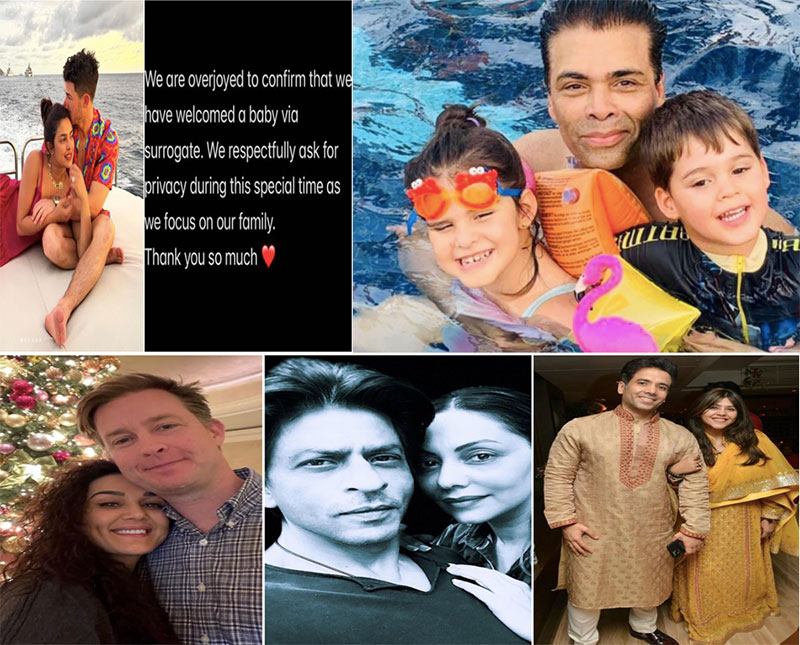 Surrogacy
Surrogacy
Welcoming babies with wombs on rent
Star couples, most recently Priyanka Chopra and Nick Jonas, proudly announce their new parenthood through surrogacy these days. Does this new openness and acceptance by society at large also indicate a change in attitude, wonders Ranjita Biswas
With the entertainment industry slowly picking up and cinema halls allowing a bigger audience with the third wave restrictions easing out, two Bengali films have seen big releases this week. One of them is Baba Baby O with popular actor Jisshu Sengupta acting as a 40 plus old bachelor opting for single fatherhood through surrogacy.
That a subject like surrogacy can be the theme of a big budget commercial Bengali film, and the target audience not confined to the so-called posh class either, is an eye-opener reflecting the changing profile of viewership. In a way, it also vindicates what is often said, that cinema mirrors contemporary society.
Perhaps fiction and real life merge somewhere.
Today, Bollywood’s big stars are not hesitant to talk about subjects like surrogacy in personal life so far discussed in a hush-hush manner or confided only to close family members.

In 2011, when Aamir Khan and (former) wife Kiron Rao revealed that they had welcomed a baby through surrogacy there was an audible gasp, and it was endlessly discussed in the media. By the time super-star Shah Rukh Khan and his wife Gauri Khan announced in 2013 that they had welcomed a third child through surrogacy it made headlines but only for a short time as people accepted it as nothing unusual.
In recent times, it has reached into another realm – that of single fathers through surrogacy; Karan Johar, Tushar Kapoor, for example. As for women celebrities, single or married, Shilpa Shetty, Farah Khan, Sunny Leone, Preity Zinta, Ekta Kapoor, to name a few, have opted for surrogacy to fulfill their dream to become parents. In the international scene with an Indian connection, the latest to join the group are Priyanka Chopra and Nick Jonas.
This is a welcome change in attitude indeed, and hopefully would lead to more conversations in a more open atmosphere. Celebrities from the silver screen, after all, have a great fan following in cinema-crazy India.

Not that surrogacy is something unheard of in our society ; it was only the veil of secrecy that kept it out of public knowledge or view. In India, especially where a married woman’s worth is weighed on the scale of motherhood, the inability to conceive earns her unkind comments and ill treatment in the marital home. The social and mental pressure even led many women to commit suicide.
Medical advances with new technologies have revolutionised the scene for couples wanting to have a progeny with interventions, like IVF (In Vitro Fertilisation), surrogacy etc. where adoption is not a personal choice. Subsequently, many centres known as ART (Assisted Reproductive Technologies) clinics cropped up, especially in states like Gujarat, Rajasthan and India came to be known internationally for surrogacy options. Initially the clients were mostly NRIs and white couples from western countries where commercial surrogacy was illegal.
‘Commissioning parents’ – as they are known in the business, came familiar with the possibility of earning money through carrying a child for another couple.
This rampant ‘commercialisation of the womb’, as described by many, raised a hue and cry by activists and NGOs working in the field of healthcare who pointed out that poor women in need of money were exploited by the rich. As a result the government banned commercial surrogacy in 2017 to take up investigation of the allegations.

In 2021, The Surrogacy (Regulation) Bill, 2020, was passed by Rajya Sabha, to streamline the practice and in the new version it allows only ‘ethical’ or altruistic surrogacy, that is, involving a consenting relative in which no charges, expenses, or monetary incentive, except medical expenses, are given to the surrogate mother.
However, those opposing the bill say that it is another way of exploiting the woman thereby denying her right of choice.
On the other side of the coin, for many poverty-stricken families opting for surrogacy by a healthy woman who is already a mother, and with consent of the husband, it was a way out of penury as the money received was substantial (though there were allegations of less money paid from the promised amount and middlemen siphoning off money persisted).
In celebrated Sahitya Akademi winning Assamese writer Arupa Patangia Kalita’s story Rajmao, Kamala is a poverty-stricken woman who takes up a job in far-off Delhi to pay for her bedridden husband’s treatment and children’s food and education. When she returns home, obviously flush with money, jealous neighbours whisper that she could have taken the dark lane of flesh trade. A maid couldn’t earn that much, right? Kamala cannot reveal that she accepted the offer to bear a child by the rich infertile couple, her employers. That could lead to ostracisation from the close-knit village community.
Such social issues, and psychological as well as the mother having to give up the baby as soon as he or she is born, are real too. But it is a choice a willing woman as well as the couple who wants to go for surrogacy make for various reasons. What is new is that even the rich and famous do not mind talking about something which would have been considered a PR disaster once. Perhaps it is a comment on changing times too.
Support Our Journalism
We cannot do without you.. your contribution supports unbiased journalism
IBNS is not driven by any ism- not wokeism, not racism, not skewed secularism, not hyper right-wing or left liberal ideals, nor by any hardline religious beliefs or hyper nationalism. We want to serve you good old objective news, as they are. We do not judge or preach. We let people decide for themselves. We only try to present factual and well-sourced news.







